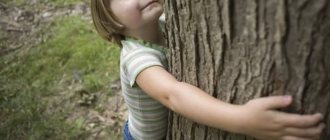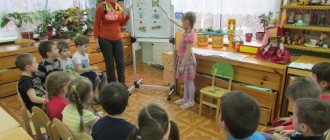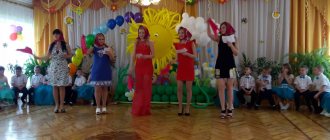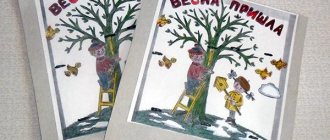MAGAZINE Preschooler.RF
Inclusion of parents in the organization of kindergarten work on environmental education of preschool children.An article about love for nature.
Teacher of MBDOU “Kindergarten No. 63”, Ulyanovsk, Khakimov. S.R.
In an empty matchbox there is a whole family, in an empty matchbox there are four ants.
I study their habits, their lifestyle, their appearance. - Put the matches back! —
Suddenly my grandmother tells me. I failed to become a scientist, I had to put matches in place. And the ants are in the green grass
We managed to escape and disappear.
A. Barto “Young naturalist”
Raising an environmentally literate person is an integral part of preschool education. It is obvious that the organization of environmental education is impossible without relying on the family values and traditions of a preschooler, without involving parents in the work of creating an environmental culture.
According to the new Federal State Educational Standard for Preschool Education, environmental education is implemented in the educational field called “Cognitive Development” . The Federal State Educational Standard for Education sets the goal of the educational field “Cognitive Development” : the development of cognitive interests and cognitive abilities of children, which can be divided into sensory, intellectual-cognitive and intellectual-creative.
The transformation of the tasks of the Federal State Educational Standard in the field “Cognitive Development” regarding environmental education allows for the development of curiosity about nature and cognitive motivation in a preschool educational organization (hereinafter referred to as the PEO); the formation of cognitive actions in relation to natural phenomena, the formation of environmental consciousness; development of imagination and creative activity in the process of knowledge of natural phenomena, and human relations to nature; the formation of primary ideas about the natural objects of the surrounding world, their properties and relationships, about the planet Earth as the common home of people, about the features of its nature and the influence of humans on it.
Our work to include parents in the process of environmental education in preschool educational institutions is a system based on the goal of educating preschoolers’ environmental culture, and the tasks that determine the components of this system:
- diagnostics of the level of environmental culture (literacy) of preschool children using various methods (for example, games, methods using fairy tales, visual activities)
- determining the directions of work for the formation of the ecological culture of preschool children, namely: the formation of a system of environmental knowledge and ideas (the formation of a cognitive component) and the development of aesthetic feelings (the formation of an emotional component) through the participation of children in activities feasible for them to care for plants and animals, to protect and protection of nature (formation of an activity component), which ensures the education of a humane attitude towards nature
- identifying the level of understanding by parents of the essence of environmental education of preschoolers, determining the needs of parents in the environmental education of preschoolers
- determination of the most optimal forms and methods of developing the ecological culture of preschool children, ensuring the inclusion of parents in the implementation of the above areas in preschool educational institutions
- analysis of the results obtained.
We will describe our work to include parents in the process of forming the ecological culture of preschoolers.
Diagnosis of the ecological culture of preschoolers was carried out at the beginning of the school year in the preparatory group. A number of diagnostic classes were conducted aimed at identifying the level of understanding of the dependence of plants on factors of inanimate nature, and at determining the level of mastery of knowledge about connections and interactions in ecosystems. During classes and routine moments, children were involved in play situations, became acquainted with literary works on environmental topics, expressed their attitude to the characters’ characters, and analyzed situations from books.
In addition, children were given tasks aimed at identifying the level of formation of ideas about living and inanimate nature, knowledge about nature. A diary of environmental education of preschool children was compiled during the observation.
Identification of the level of understanding by parents of the essence of environmental education of preschoolers and the needs of parents in the environmental education of preschoolers was determined using a questionnaire, which included questions such as:
— How do you understand the essence of ecology?
— Do you have indoor plants and pets at home?
— How do you involve children in caring for pets and indoor plants?
— Do you and your child worry about the fact that birds and animals in the forest need feeding in winter?
— Would you be interested in making feeders and birdhouses together with your child?
— Would you be interested in planting plants with your child?
— Are there any traditions in your family related to caring for trees, birds in parks, etc.? If so, what are they and how often do they occur?
— Do you often go with your child to the forest, on the river, in nature? Is a picnic always the reason for going out into nature?
— During walks in nature, do you communicate about the importance of nature, about the conservation and beauty of nature?
— Do you often talk with your child about the benefits of trees, birds, herbs, berries, insects?
— Are conversations with your child on nature topics spontaneous or planned in your family?
— Do you read works about nature with your child, do you introduce him to signs, proverbs and sayings about nature?
— If you and your child see a lonely kitten or dog, do you have a desire to warm it, feed it, take it home? What about the child?
The organization of work to include parents in the process of forming the ecological culture of preschoolers was carried out according to a questionnaire, which did not contradict the areas of work highlighted above. So, to understand the essence of ecology and form ideas about nature, parents together with their children drew pictures about living inanimate nature, about environmental problems. To develop skills in caring for indoor plants and pets, work was organized in the form of planting campaigns and growing seedlings for the territory Preschool educational institution, growing indoor plants for a corner of nature in a group.
In spring and autumn, on the territory of the preschool educational institution, adults and children carried out actions to plant trees, which were looked after by preschoolers and their parents; a bird festival was organized with the production of feeders and an exhibition of birdhouses, which were installed on the territory of the preschool educational institution by parents with the help of children.
Thus, “action” as a form of organizing work turned out to be very relevant. “Bird House” , “Feed the Tits” , “My Seed” , “Group Tree” , “Nature Corner” , “Grow a Vegetable” , “I Love Nature” , etc. were held
The parent committee of the group participated in the selection of video material about nature, which children could sometimes watch during special moments; a fairy-tale corner was organized on the group’s site using various plants to decorate the territory of the preschool educational institution. During excursions to the park, children became acquainted with birds, where feeders and birdhouses were also installed together with their parents.
Particular attention should be paid to the parents' corner, where information about natural seasonal phenomena and recommendations for reading works and memorizing poetry was updated daily. The group, together with parents, carried out the “Ecological Stand” , according to which families of pupils updated information on their achievements in the field of environmental education on a weekly basis at an organized stand. One of the highlights was the environmental projects carried out by several families of the students. Projects included games, walks, observations of natural phenomena and their description in children's drawings, as well as a selection of works describing natural phenomena. At the stand, parents and children shared their impressions of what they saw during the week - about interesting events that happened in their lives related to nature and ecology.
Analysis of the results obtained allows us to conclude that
- 10% of families in the group developed new family traditions related to caring for natural phenomena
- 3 families have pets
- By the middle of the school year, 15% of families had increased their participation in actions and events that took place in preschool educational institutions related to ecology
- by the second half of the year, the number of families participating in the Ecological Stand increased from 10 to 65%
| Next > |
Consultation for parents “Formation of the foundations of a child’s environmental culture”
CONSULTATION FOR PARENTS
on the topic: “Formation of the foundations of a child’s ecological culture”
The transfer of environmental knowledge is the initial stage of developing a habitual attitude towards the world around us.
In the process of environmental education, the following types of activities can take place: 1. Role-playing game, reflecting various events in nature. 2. Practical activities to create or maintain conditions for living objects in the kindergarten area - work in nature, as well as activities to restore objects (repairing toys, books). 3. Children's creativity based on impressions of nature or people's activities in nature. 4. Communication with nature, contact with objects of flora and fauna. 5. Experimentation: practical cognitive activity with natural objects, accompanied by observation and statements. 6. Speech activity (questions, messages, participation in conversation, dialogue), exchange of information, impressions, clarification of ideas about nature using words. 7. Observation (independent cognitive activity), providing information about the nature and activities of people in nature. 8. Watching books, paintings, and television programs with natural history content is an activity that helps to obtain new and clarify existing ideas about nature. 9. Observation of children’s independent activities and analysis of their content allow the teacher to discover their individual characteristics and level of environmental awareness.
A variety of activities naturally connects environmental education with the entire process of personal development. Preschool childhood is a crucial period of a person’s life: the foundations of a correct attitude towards the world around us are laid - nature, things, people.
The work on environmental education of children of this age has great opportunities and prospects. In ecology, the central concepts are the interaction of an individual organism with its habitat and the functioning of an ecosystem - a community of living organisms living in the same territory and interacting with each other.
The basis of environmental education is the leading ideas of ecology, adapted for preschool children: the organism and the environment, the community of organisms and the environment, man and the environment.
The goal of environmental education of children is the formation of the principles of environmental culture. This goal is consistent with the concept of preschool education - to lay the foundation of personal culture and humanistic qualities in a person in preschool childhood. Beauty, goodness, truth in the four leading spheres of reality - in nature, the man-made world, the people around us and oneself - these are the values that preschool teachers of our time are guided by.



